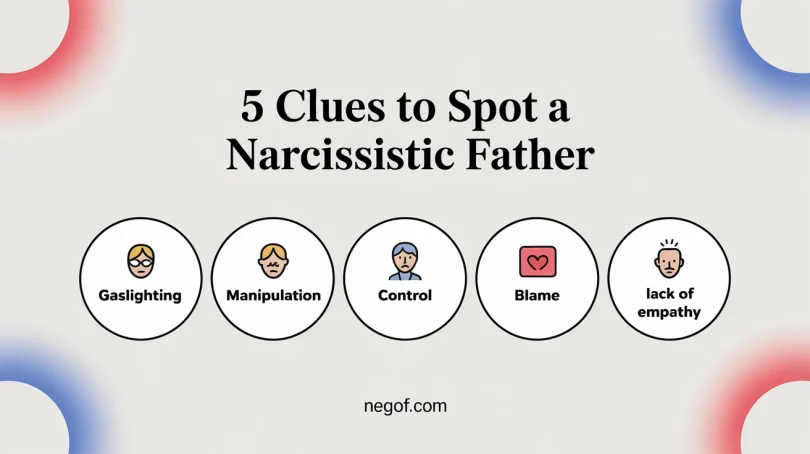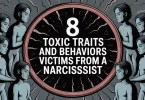Do You Have a Narcissistic Father? Have you ever walked away from a conversation with your father, stepdad, father-in-law, or even your ex, feeling small, dismissed, or emotionally drained, but you couldn’t quite explain why? That uneasy feeling isn’t random. If you find yourself shrinking, second-guessing, or suddenly feeling like you owe him something, whether he’s speaking to you, your kids, or someone you love, you might be dealing with a narcissistic father.
In this article, you’ll learn five clues to recognize a narcissistic father in conversation, how to spot the danger early, and what to do to avoid getting pulled into his manipulative patterns.
Clue 1: Praise That’s About Him, Not You
Some fathers celebrate their kids for who they are. Narcissistic fathers only celebrate what they can claim. This is the first clue to spotting a narcissistic father in conversation: praise that isn’t about you, it’s about him. He doesn’t offer support because you’ve grown or accomplished something meaningful. He only highlights your success when it serves his ego, when it makes him look good in front of others, or reaffirms the story he tells about himself.
You’ll hear things like, “Of course she’s good at piano. Look who taught her,” or, “That’s my boy. He’s got all my talent.” This isn’t real praise; it’s a form of self-promotion. You’re not being seen, you’re being used.
Your talents, your success, your story, it’s all just material for him to glorify himself. And the moment your success starts to outshine his or reflect something he can’t control or relate to, the attitude shifts. You’ll get the cold shoulder, a backhanded jab, or outright dismissal, like, “That’s not real work,” or, “You’ve always thought a little too highly of yourself, haven’t you?”
What looks like praise on the surface is something else entirely. It’s objectification disguised as pride. The child becomes a tool, a prop used to elevate his image, not someone to support or celebrate.
Related Topics:
3 Clues to Spot a Malignant Narcissist in Conversation
Understanding the 4 Types of Narcissism
7 Nice Things Covert Narcissists Do to Secretly Control You
Clue 2: Entitlement to Ownership, Not Relationship
Some fathers don’t want a connection; they want control. This is the second clue to spotting a narcissistic father in conversation: entitlement to ownership, not relationship. A narcissistic father believes your life exists to serve his. Love should come without limits. Boundaries are interpreted as disloyalty.
In a healthy parent-child relationship, love and autonomy go hand in hand. But narcissistic fathers expect emotional access, loyalty, and compliance not because of who they are, but because they believe they are owed it. They think, “I made you, so I own you.” Often, these beliefs don’t come directly from him.
If he’s passive, distant, or covert, you might not hear the entitlement in his voice. You’ll hear it from the voice of the enabling parent the parent who says, “It would mean a lot to your dad if you called more,” or, “He just wants to be included. You know how he is,” or, “You don’t want to regret not showing up for him someday.”
This sounds like a concern, but it’s a delivery system for his entitlement. The expectation is clear: your time, your energy, your loyalty, he believes it belongs to him. When you assert independence, the reaction might be subtle, but it’s always there: emotional withdrawal, guilt trips, silent treatment, or betrayal designed to remind you where your loyalty should have been.
Unlike narcissistic mothers, who often seek emotional closeness or admiration, narcissistic fathers tend to stay emotionally distant while still demanding access, obedience, and control.
Clue 3: Withholding Support, Demanding Loyalty
A narcissistic father expects loyalty, presence, and obedience but rarely offers anything meaningful in return. This is our third clue: he withholds what you need but still demands unwavering allegiance. He doesn’t show up for your emotional needs. He doesn’t offer comfort, care, or compassion in moments that matter to you, but he will expect you to show up for him when he wants attention, praise, resources, or validation.
His involvement is never mutual; it’s transactional and always on his terms. Despite offering nothing, he still acts like everything is his. Any perceived intrusion on his space, time, or resources is punished. You’ll hear things like, “That’s mine,” even if it’s something shared, like food in the fridge. His neglect doesn’t reduce his demands, it intensifies them.
When you don’t prioritize him or meet his unspoken expectations, he punishes you through emotional distance, judgment, or rejection. You’ll hear it in phrases like, “You’ve made up your mind,” or “I thought you were better than that.” These aren’t expressions of disappointment, they’re calculated withdrawal, meant to remind you that failing to meet his needs will cost you something.
Even when you comply, it’s not enough. The expectation isn’t just high, it’s constantly shifting. The goalpost moves every time you get close. It’s a setup that keeps you striving, apologizing, and trying harder to prove yourself.
The grandiose narcissist demands overt loyalty and affirmation of his grandiose self-image, while the covert narcissist demands emotional reassurance and affirmation of his special needs. In both cases, the message is the same: you didn’t meet my needs, you failed me, and now you will feel the consequences.
Clue 4: Criticism as Coercion
A narcissistic father doesn’t criticize to guide or protect; he criticizes to shame, control, and dominate. This is our fourth clue: criticism isn’t correction; it’s coercion. You’ll hear him make comments about your appearance, your choices, your weight, your parenting, or even your children, not with care or curiosity, but with calculated disdain. Sometimes it sounds like sarcasm, sometimes it’s masked as concern, and sometimes it’s just outright cruel.
He might say, “You’re letting yourself go,” or, “That kid’s going to be a nightmare if you don’t get control of him,” or, “I hope you’re not wearing that in public.” This isn’t about helping you improve, it’s about keeping you small. His goal is to reestablish superiority, to create a dynamic where you feel ashamed, exposed, or dependent on his approval to feel okay again.
For some, this shows up as humiliation, like weighing a daughter to control her food, mocking a partner’s body in front of others, or turning someone’s parenting into the punchline of a joke. For others, it’s quieter: a condescending smirk, a passive-aggressive comment, or a dismissive tone that says, “You’ve disappointed me again,” without ever using those words.
The truth is, a narcissistic father sees you as an extension of himself. You’re not allowed to exist as your person. You’re expected to reflect his idealized image, and any deviation from that is treated like a personal insult. Your job isn’t to grow, it’s to stay in line.
Clue 5: Enforcing His Fantasy
A narcissistic father doesn’t just see himself in a certain way, he expects everyone around him to uphold that image. This is our final clue: he builds a fantasy of who he is, and you’re expected to play your role inside it. Sometimes that fantasy sounds like success, brilliance, talent, admiration, or inflated achievements. Other times, it sounds like suffering, self-sacrifice, being misunderstood, or never getting the credit he deserved.
You’ll hear dramatized memories, exaggerated accomplishments, and selective retellings of events where he’s either the hero or the victim. In these conversations, the facts don’t matter. What matters is preserving the image, and your role in that fantasy is not optional.
You’re expected to enter it with him, to pretend, to overlook the gap between reality and the story he’s telling. You’re not just asked to support him, you’re expected to cut ties with the truth and align yourself with his version of events, even when it contradicts your memory, your own experience, or observable reality.
The grandiose narcissist wants admiration, and the covert narcissist wants pity. But both want the same thing: agreement, compliance, and participation in their illusion. You’re not allowed to see him accurately, you’re expected to reflect the version of himself he believes in and protect it at all costs.
How It Affects You
You might be wondering if these conversations play out differently if you’re the daughter or the son. The answer is sometimes, but it has less to do with gender and more to do with what your father values and what threatens his ego.
A daughter might be pushed to succeed financially so that he can benefit or scrutinized for her appearance if it challenges his image of superiority. A son might be pressured to be athletic or admired to compensate for his father’s inadequacies, or rejected if his success makes the father feel small.
In a narcissistic family system, it’s never about who you are, it’s about how well you reinforce the version of himself that he wants to believe in. If these clues feel familiar, you’re not overreacting, and you’re not imagining it.
Growing up with a narcissistic father leaves you carrying a weight you were never meant to hold. You were expected to meet his needs, mirror his image, manage his moods, and protect his ego while your own needs went ignored or punished. It’s confusing because it’s personal. This was the person who was supposed to care for you, and instead, you were put in the role of being his caretaker.
These patterns don’t just affect how you relate to him, they shape how you see yourself. But naming them is the first step to seeing the truth, setting boundaries, and reclaiming your voice.







Leave a Comment